News & Media
Buti Manamela spotlights digital transformation and upskilling in TVET sectors
From 25 to 27 September 2024, Unisa, in partnership with the South African Public Colleges Organisation (SAPCO), supported by the Education Training and Development Practices Sector Education and Training Authority (ETDP SETA), the Department of Higher Education and Training (DHET), the UNESCO-UNEVOC International Centre for Technical and Vocational Education and Training and other key partners, hosted the first International Conference on Technical and Vocational Education and Training (ICTVET2024), convened and chaired by Prof Sello Mokwena. The conference, themed Advancing TVET for Digitalised World, Youth Skilling, Employability and Sustainable Development (National, Regional, Continental, and International), took place in Stellenbosch in the Western Cape.
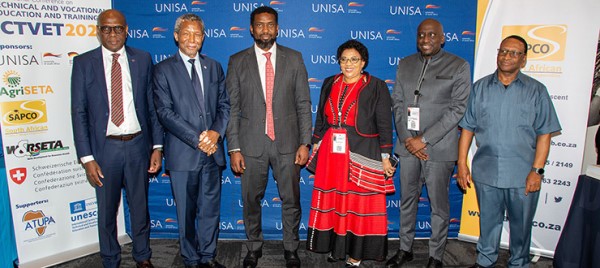
From left: Sam Zungu, Deputy Director-General: TVET Colleges, DHET; Prof Solomon Magano, Acting Vice-Principal: Institutional Development, Unisa; Buti Manamela, Deputy Minister of Higher Education; Nombulelo Nxesi, CEO: Education, Training and Development Practices Sector Education and Training Authority; Matsiababa Motebele, Vice-Principal: Facilities and Operations, Unisa; and Prof Sello Mokoena, conference convenor/chair
This first-of-its-kind conference saw academicians, scholars, technical and vocational education and training (TVET) practitioners, policymakers, international organisations, industry, businesspeople, entrepreneurs and other TVET stakeholders meet to discuss and explore innovative approaches and good practices to enhance TVET systems, and empower TVET teachers through reskilling and upskilling for the country’s sustainable future.
TVET institutions must remain agile and adaptive
In his welcome address, Prof Solomon Magano, Unisa Acting Vice-Principal: Institutional Development, asserted that global disruptions such as climate change, digitalisation, the fourth industrial revolution (4IR), demographic changes and migration are changing the way we live, work and learn. He said new technologies are emerging, remote forms of working and learning are becoming commonplace, and workers need new skills involving problem-solving and information and communication technologies (ICTs), and encompassing STEM (Science Technology Economics and Mathematics) areas.
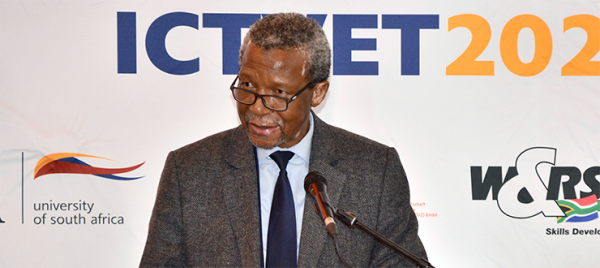
Prof Solomon Magano
Magano stated that TVET institutions must rise to the challenge of supporting learners to prepare them for the workplace of the future, adding: "Among other things in the era of massive and unprecedented changes in the way we live and work, the International Labour Organisation proposes that we have a human-centred agenda for the future of work where we forge new paths that reinvigorate the social contract that gives working people a just share of economic progress, respect for their rights and protection against risk for their continuous contribution to the economy."
He continued: "As we progress towards an increasingly digital world, it is essential to advance technical and vocational education and training (TVET) to equip young people with the necessary skills and knowledge to thrive in the job market. Simultaneously, we must ensure that TVET programmes are designed to meet sustainable development needs and provide opportunities for employment and entrepreneurship."
Underpinning the significance of TVET colleges, Magano outlined that they stand as a pivotal tool in addressing the global skills shortage, particularly in emerging economies and technologies, and in supporting the transition towards a digital economy. He stated that they offer an effective pathway for young people to acquire the skills required for future employment and to contribute to the achievement of the Sustainable Development Goals.
Furthermore, Magano asserted that TVET colleges play a pivotal role in supporting economic growth and development, especially in countries where technical skills are critical to industrial expansion. He added: "Skilled workers who have undergone vocational training are essential for building infrastructure, advancing manufacturing capabilities and driving innovation in technology-driven sectors. The ability of TVET institutions to supply the workforce capable of meeting present and future needs centre them as key players in fostering regional and national development, in line with this conference’s theme."
"TVET colleges therefore," said Magano, "play a pivotal role in equipping young people with skills required for today’s digital world and ensure that they are employable and capable of contributing to sustainable development in their respective communities."
Concluding his message, Magano drew attention to Unisa’s catalytic niche areas (CNAs), which, he said, were conceptualised and are practised to advance youth skilling, improve employability and contribute to sustainable development across the world. He added: "By focusing on the CNAs, the university not only empowers the youth for high-demand skills, but additionally ensures that TVET college lecturers are prepared to transfer the requisite skills and knowledge to the upcoming workforce. The university’s strategic priorities reflect a commitment to empowering both students and educators in TVET sectors in helping both students and educators, with the aim of creating a skilled workforce, agile and adaptive in the age of digitalisation and other modern challenges."
TVET contribution to employability
Prof Phutsisi Dipiloane, President of SAPCO and Principal of Motheo TVET College, said that the conference was a historical event in post-school education and training in the country. She said TVET colleges play a unique role in the higher education sector and the development of the economy of the country.
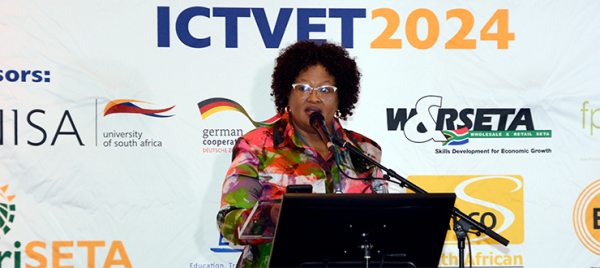
Prof Phutsisi Dipiloane, President of South African Public Colleges Organisation and Principal of Motheo TVET College
"This conference’s theme," she said, "necessitates modernisation and improvement of our education and training programmes in order to address challenges of the digital age and the current global market." She added: "This includes enhancing skills among youth, promoting employability, and fostering environmentally sustainable development. It is also essential to ensure that education and training programmes are aligned with the evolving needs of the job market, with a focus on preparing the next generation to be skilled in tandem with the rapidly changing economy, whilst promoting long-term sustainability and prosperity."
"Furthermore," concluded Dipiloane, "vocational education and training plays a crucial role in fostering growth, development and poverty reduction in our societies. This conference should contribute to enhanced employability, entrepreneurship, self-employment, industry relevance and productivity, whilst addressing identified skills gaps and shortages in specific sectors."
Interventions to upskill and reskill teachers
In his keynote address, Buti Manamela, Deputy Minister of Higher Education, stated that this event stands out as more than just an event on the academic calendar. "It represents a beacon of hope and innovation in a rapidly evolving educational landscape," he said. "This gathering has convened vocational educators, industry leaders and policy makers to drive forward the global agenda of enhancing vocational education, therefore, together we are shaping the future of work and positioning our youth for success in the 21st century."
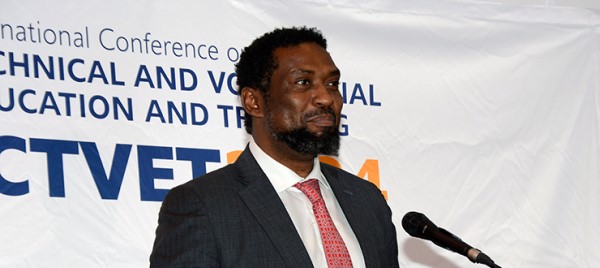
Deputy Minister Buti Manamela
Manamela revealed that the higher education department is acutely aware of the shifting demands of the global job market and the vital role technology plays in modern education and training.
He continued: "As we respond to the challenge of the 21st century, our country has embarked on a transformative journey towards digitalisation in the TVET sector driven by 4IR. Our commitment to this transition is evident in the establishment of 16 4IR hubs across TVET colleges, which serve as innovation centres where students engage with cutting-edge tools and technologies. By immersing learners in real-world experiences, we are additionally bridging the gap between education and employability in preparing the youth to meet the demands of an increasingly competitive job market."
"The key element in the success of these initiatives," said Manamela, "lies in the upskilling of educators through partnerships and collaborations with companies such as Cisco and Huawei, local universities such as the Tshwane University of Technology and the University of Johannesburg, the Department of Communication and Digital Technologies, and the University of Stuttgart. These entities, and many others, are capacitating our lecturers with the necessary digital skills to meet the demands of the future workplace."
Manamela expounded on other key role players in helping to reskill TVET teachers, noting the report from the International Labour Organisation and Harambee Youth Employment Accelerator which highlighted a shortage in critical digital skills gap in South Africa. He added: "The demand of critical skills far exceeds supply, therefore addressing this shortage is crucial to ensure our country’s long-term competitiveness."
In conclusion, Manamela affirmed that at the core of this endeavour lies the transformation of teachers through strategic interventions. "By consistently implementing these collaborative interventions, we can anticipate multifaceted outcomes. We commend all the initiatives and participants involved in this gathering for their dedication to teacher-centred approaches, student-teacher exchange programmes, the development of smart classrooms and campuses in all TVET colleges, the expansion of access to vocational education and training, and the establishment of specialised high-tech centres within these colleges."
Misconstrued perceptions of TVET colleges
Prof Monde Ntwasa, Acting Executive Dean of Unisa’s College of Agriculture and Environmental Sciences, amplified the significance of this pivotal collaboration, underscoring the topics discussed by preceding speakers as anchors of the future of TVET colleges and other higher education sectors, adding that TVET colleges are, by design, vocational and not mere stepping stones for university access. "This," he said, "is a testament to their unique role in the country."
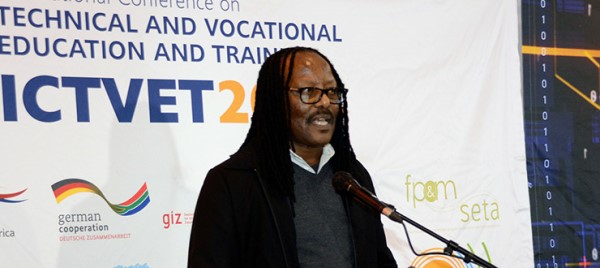
Prof Monde Ntwasa, Acting Executive Dean of Unisa’s College of Agriculture and Environmental Sciences
Concluding, Ntwasa highlighted that TVET colleges offer a specialised focus on vocational training, catering to the specific needs of the industry and labour market. He added that their hands-on approach equips students with the skills and competencies that are highly sought after by employers, making such students valuable assets to the economy.
Throughout the conference, various scholars presented papers on how to positively impact TVET colleges in improving teacher and student outcomes and employability.
* By Godfrey Madibane, Acting Journalist, Department of Institutional Advancement
Publish date: 2024/09/27

 Unisa co-hosts G20 community outreach in the Eastern Cape
Unisa co-hosts G20 community outreach in the Eastern Cape
 Unisans gain membership of prestigious science academies
Unisans gain membership of prestigious science academies
 Advocating for disability transformation through servant leadership
Advocating for disability transformation through servant leadership
 Unisa Press continues to illuminate the publishing space
Unisa Press continues to illuminate the publishing space